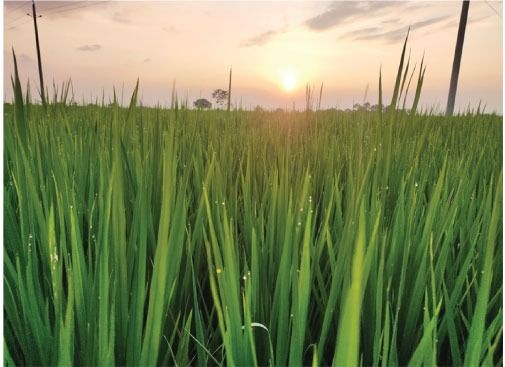- info@ficci.org.bd
- |
- +880248814801, +880248814802
- Contact Us
- |
- Become a Member
- |
- |
- |
- |
- |

The world yet to produce enough foods for everyone. World Food Programme (WFP) says, in 2024, a total 309 million people face acute hunger globally. Of these, more than 37 million people face emergency levels of hunger or worse. Nearly 821 million people - one in nine - still go to bed on an empty stomach each night.
It is estimated that by 2050 the global food production will need to increase by 50 percent to feed the increasing population. This is going to be a daunting task in the backdrop of decreasing arable land, adverse climatic changes and increasing pressure of insects and diseases.
Situation in Bangladesh is also very challenging in terms of food security. In the 2024 Global Hunger Index (GHI), Bangladesh ranks 84th out of the 127 countries. WFP survey revealed, 24 percent of people in the country are food insecure. Meanwhile, a 2023 report on global food security and nutrition by five United Nations agencies said that more than 5 crore people in our country are in severe to moderate food insecurity. Among them, 1 crore 87 lakh people are in severe food insecurity.
The story doesn't stop here. Country's population is expected to be 20 crores in 2050. To feed this huge population we have no option but to increase food production significantly.
Study shows, every year up to 40 percent of global crop production is lost because of pests and diseases. According to a FAO report, plant diseases cost the global economy around $220 billion annually, and invasive insects around $70 billion. Weeds are another significant biotic constraint on global food production.

Crops have to incessantly fight against nearly 30,000 species of harmful weeds, 3,000 species of deadly nematodes, 10,000 species of plant-eating insects and numerous dangerous fungi for their survival. These harmful weeds, insects, and fungi are commonly referred as pests. Crop protection (CP) products, usually known as pesticides or agrochemicals, are applied to control harmful pests. Typically, pesticides include insecticides for controlling insects, herbicides for managing weeds, and fungicides for protecting the plants from various diseases. Sanitizers, plant growth regulators (PGR), rodenticides and so on are also considered as pesticides.
Some CP products have crop enhancement (CE) properties that boost crops' vigor and improve flower and fruit settings ability, resulting in more yields. These chemistries also help the grains or fruits to become shinier and bolder and eventually facilitate the farmers to obtain better market price for their products.
FAO data shows, in 2022 total pesticides consumed in agriculture globally was roughly 3.70 million metric tonnes of active ingredients (Al). Approximately, Europe consumes 45 percent, the US 25 percent and the rest of the world the remaining 30 percent of the pesticides. Herbicides account for 48 percent of total pesticides applied globally, followed by insecticides at 30 percent and fungicides at 18 percent, and others at 04 percent.
Extracting the text from the image. One moment, please.
Here is the extracted text from the image:
According to a report, China is the largest pesticide-consuming country in the world, followed by the US and Brazil. Per hectare pesticide usage in China is about 13 kg. Pesticide consumption in per hectare of land in some of the other developed countries is: Japan 11.8 kg, France 4 kg, Germany 3.8 kg, the UK 3.2 kg, Canada 2.4 kg, and the US 2.5 kg.
FAO report shows, pesticide consumption per hectare of land in Bangladesh is about 1.80 kg. Total pesticides consumption in the country in 2022 was nearly 15,500 tonnes of active ingredients.

The Crop Protection (CP) industry plays important role in the country’s agriculture sector in terms of enhancing food production and thus helping the country to drive its food security agenda. The present market value of the industry is about $330 million. In the last ten years, the industry has experienced double-digit growth. In coming days CP industry is expected to grow at a similar pace, if not better, since the country needs to boost its agriculture productivity to ensure food security for its increasing population.
Presently, there are more than 500 companies working in the sector, employing approximately 30,000 people. Almost 50,000 dealers across the country are involved in selling pesticides.
Despite its significant contribution to the country’s agriculture, CP industry often fails to get due recognition; rather, wrong perceptions exist about pesticides in the minds of many. Quite often, preservatives like formalin or chemicals like carbide are mixed up with agrochemicals.
To deal with the wrong perceptions, Bangladesh Crop Protection Association (BCPA) along with the leading companies should engage with different stakeholders to make them aware of the facts.
They need to keep on promoting integrated pest management (IPM), which is a well-recognized scientific means recommended by scientists and competent authorities to handle pest problems. IPM endorses the usage of chemicals or pesticides along with other ways and means. Growers should be adequately trained on the safety measures to be taken during pesticide application to avoid any adverse impact. This is a highly technical sector that requires sound knowledge. To ensure judicious use of pesticide, there is no alternate to imparting the knowledge across the value chain, from the dealers to the farmers.
Another acute challenge for the sector is the counterfeit and adulterated products. Farmers often get cheated with fake chemicals. The concerned regulatory authorities along with the law enforcing agencies need to strengthen their vigilance and bring those unscrupulous peddlers to justice to safeguard farmers’ interests. Sustainable Development Goal (SDG) # 2 clearly articulates that by 2030 end hunger, achieve food security and improve nutrition and promote sustainable agriculture. To achieve this target, CP industry is playing a critical role. Therefore, this important industry needs to be nurtured with proper guidance and support.





